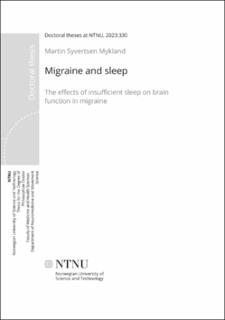| dc.contributor.advisor | Omland, Petter Moe | |
| dc.contributor.advisor | Sand, Trond | |
| dc.contributor.advisor | Uglem, Martin | |
| dc.contributor.author | Mykland, Martin Syvertsen | |
| dc.date.accessioned | 2023-10-06T06:11:52Z | |
| dc.date.available | 2023-10-06T06:11:52Z | |
| dc.date.issued | 2023 | |
| dc.identifier.isbn | 1503-8181 | |
| dc.identifier.issn | 2703-8084 | |
| dc.identifier.uri | https://hdl.handle.net/11250/3094698 | |
| dc.description.abstract | Background
Migraine affects about 15 % of the adult population aged 15-64 years old. The combined large prevalence and considerable disability of migraine makes it the first cause of most years lived with disability below 50 years of age. Despite this enormous burden of the disease, the migraine pathophysiology is not yet understood.
The clinical association between migraine and sleep is described in literature dating back to the 17th century. However, the cause of this association has not been elucidated. Recent findings indicate that some regions and networks of the brain which are involved in sleep physiology, also constitute parts of the regions involved in migraine pathophysiology.
Dysregulation of thalamocortical excitability due to inhibitory or facilitatory mechanisms have been indicated to play a part in the migraine cycle pathophysiology. Inhibitory and facilitatory mechanism can be investigated using transcranial magnetic stimulation (TMS) and electroencephalography (EEG). The effect of sleep restriction on these measurements may provide new insight into the role of sleep in migraine.
We hypothesised that migraine patients have an underlying dysfunction of sleep-wake systems and thalamocortical excitability which would respond differently to changes in sleep compared to controls, throughout the migraine cycle and in sleep related migraine subgroups.
Methods
We examined 51 migraine subjects and 29 healthy controls after two nights of eight hour habitual sleep and two nights of four hour restricted sleep. We performed measurements using TMS and EEG to evaluate cortical silent period (CSP), short interval intracortical inhibition (SICI), intracranial facilitation (ICF), long interval intracortical inhibition (LICI), short latency afferent inhibition (SAI), beta-event related desynchronisation (beta-ERD) and beta-event related synchronisation (beta-ERS). Investigations and analyses were performed by a blinded investigator.
Main results
We detected reduced CSP duration after sleep restriction in interictal migraine. This finding was specific for the non-sleep related migraine subgroup and correlated with ictal symptoms of hypersensitivity and dopaminergic premonitory symptoms. In the sleep related migraine subgroup, LICI and beta-ERS was reduced after sleep restriction.
Before migraine attacks LICI was reduced after habitual sleep and increased after restricted sleep. SAI was decreased after sleep restriction preictally.
After attacks SICI and beta-ERS was reduced and ICF and beta-ERD increased after sleep restriction.
Conclusion
Migraine pathophysiology may encompass a dysfunction of GABA-B mediated inhibition interictally which responds abnormally to insufficient sleep. This dysfunctional GABAergic system seems to be regulated by dopaminergic modulation and hypothalamic mechanisms. Sleep and non-sleep related migraine pathophysiology may involve different types of alterations in GABA-B mediated inhibition. The GABAergic dysfunction appears to be further altered preictally and gradually towards attack commencement. Furthermore, sleep restriction during attacks may introduce a postictal brain dysfunction similar to what has been found in healthy subjects after total sleep deprivation. This finding indicates increased need for sufficient sleep during migraine attacks to maintain neurological functioning. | en_US |
| dc.language.iso | eng | en_US |
| dc.publisher | NTNU | en_US |
| dc.relation.ispartofseries | Doctoral theses at NTNU;2023:330 | |
| dc.relation.haspart | Paper 1: Mykland, Martin Syvertsen; Uglem, Martin; Neverdahl, Jan Petter; Øie, Lise Rystad; Meisingset, Tore Wergeland; Dodick, David W.; Tronvik, Erling Andreas; Engstrøm, Morten; Sand, Trond; Omland, Petter Moe. Sleep restriction alters cortical inhibition in migraine: A transcranial magnetic stimulation study. Clinical Neurophysiology 2022 ;Volum 139. s. 28-42 https://doi.org/10.1016/j.clinph.2022.04.004 This is an open access article under the CC BY license (http://creativecommons.org/licenses/by/4.0/) | en_US |
| dc.relation.haspart | Paper 2: Mykland, Martin Syvertsen; Uglem, Martin; Stovner, Lars Jacob; Brenner, Eiliv; Snoen, Mari Storli; Gravdahl, Gøril Bruvik; Sand, Trond Halfdan; Omland, Petter Moe. Insufficient sleep may alter cortical excitability near the migraine attack: A blinded TMS crossover study. Cephalalgia 2023 ;Volum 43.(3) https://doi.org/10.1177/03331024221148391 This is an open access article under the CC BY license (http://creativecommons.org/licenses/by/4.0/) | en_US |
| dc.relation.haspart | Paper 3: Mykland, Martin Syvertsen; Uglem, Martin; Bjørk, Marte-Helene; Matre, Dagfinn; Sand, Trond Halfdan; Omland, Petter Moe. Effects of insufficient sleep on sensorimotor processing in migraine. A randomised, blinded crossover study of event related beta oscillations. Cephalalgia 2023 ;Volum 43.(3) https://doi.org/10.1177/03331024221148398 This article is distributed under the terms of the Creative Commons Attribution 4.0 License CC-BY (https://creativecommons.org/licenses/by/4.0/) | en_US |
| dc.title | Migraine and sleep: The effects of insufficient sleep on brain function in migraine | en_US |
| dc.type | Doctoral thesis | en_US |
| dc.subject.nsi | VDP::Medical disciplines: 700 | en_US |
